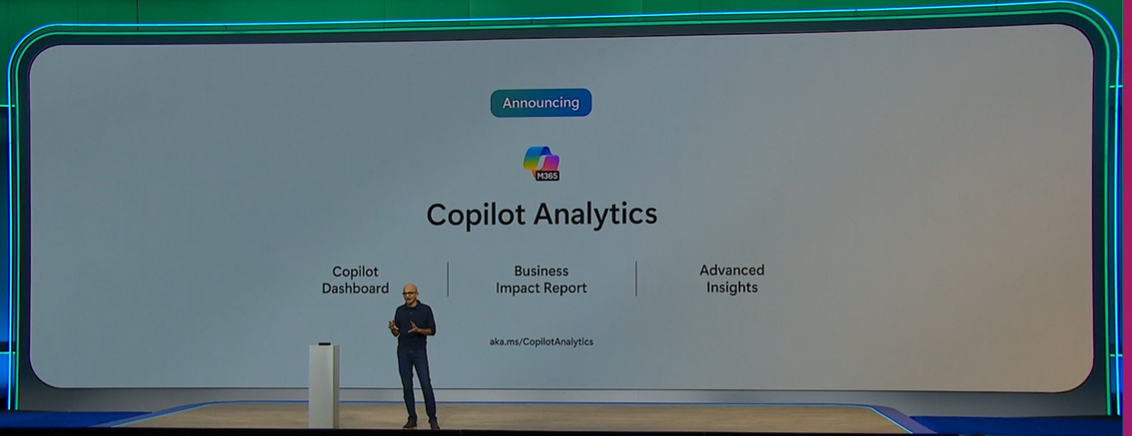Microsoft rolled out more than 80 new products and features to round out its Copilot and artificial intelligence stack as it moved to position itself as an early enterprise AI leader and a platform that can provide model choices.
At Ignite in Chicago, Microsoft made the case that enterprises are betting on its platform. The company noted that about 70% of the Fortune 500 use Microsoft365 Copilot and cited Blackrock as a company that has consolidated on Microsoft Azure.
The flurry of announcements from Ignite came just a few days before Amazon Web Services' re:Invent conference. Simply put, Microsoft is using Ignite to front-run its vision of generative AI and agentic AI orchestration as AWS is likely to hit similar themes.
At a high level, Microsoft is reinforcing recent themes. For instance, Microsoft wants every employee to leverage Copilot as a personal assistant with AI agents being rolled out to automate business processes. These agents would be designed and built in Copilot Studio to automate processes. Microsoft said enterprises will have multiple agents to orchestrate.
- Microsoft Q1 strong, Azure revenue growth 33%
- Microsoft launches AI agents for Dynamics 365, customization via Copilot Studio
- Microsoft outlines Copilot agents for enterprises
- Microsoft Build 2024: Microsoft Fabric opens up, adds real-time intelligence, Snowflake, Databricks connections
During the Ignite keynote, Microsoft CEO Satya Nadella aimed to position the company's army of agents and Copilots as productivity enhancers that drive returns.
Returns on investment--whether it was agents, performance, hardware and cloud--was a common theme for Nadella. Microsoft launched Copilot Analytics to track returns on agents and copilots.
"After users start using copilot and all these agents, one of the fundamental things that all business leaders want to do is to figure out and measure ROI," said Nadella.
Here's a look at some of the more interesting Ignite announcements:
- Copilot Actions. Copilot Actions are designed to enable employees to automate everyday tasks like getting a summary of meetings, return from vacation emails and summaries across apps.
- Agents in SharePoint. Microsoft said SharePoint will get an agent that can ground information in corporate content. Users can customize agents that are focused on specific SharePoint assets.
- Turnkey agents. Microsoft outlined agents that are in various stages of preview. Interpreter offers real-time translation. Employee Self-Service Agent is in private preview in Business Chat and can answer most common questions and actions in HR and IT tasks.
- Azure AI Foundry. Azure AI Foundry is designed to give companies a common platform to create, customize and manage AI apps. Azure AI Foundry includes all Azure AI services and tooling with previews of Azure AI Foundry ADK, Azure AI Foundry portal and Azure AI Foundry Agent Service.
- Model choices with 1,800 in Azure AI Foundry with experiment tools so customers can choose the best large language models.
- Windows 365 Link. Microsoft launched a device that's connected to Windows 365 and will be available in April for $349. Windows 365 Link is a spin on the thin client and doesn't have local data or apps.
- Microsoft Fabric enhancements. The company launched the preview of Fabric Databases, which includes SQL to create a unified data platform that can leverage transactional and analytic data. Customers will be able to automatically replicate apps to OneLake and autoscale databases.
In addition, Microsoft Fabric will get Open Mirroring, a capability that can bring any app, data provider or data store to OneLake. Microsoft also said OneLake catalog is also generally available.
Constellation Research's take
Constellation Research analyst Holger Mueller said:
Microsoft pushes ahead with AI, adding agentic capabiliies - and even showing a software demo at the IT centric Ignite. Microsoft was able to 'protect' the Copilot franchise by adding agentic capabilities - the challenge is that OpenAI models lack in performance - as the conversational customer service demos showed (even in demo mode). The way to hide and bundle complexity is via the Application Server and the applicaton server is back with Azure Ai Foundry. It was good to see the variety of Azure compute coming - and the focus on pushing Azure Arc further - to the edge. Finally, things are happening in quantum and MIcrosoft is going down the logic qubit route by partnering with Quantinuum and Atom Computing."
Constellation Research analyst Doug Henschen said the Fabric news may be notable for enterprises. Henschen said:
"Fabric was previously focused entirely on analytical use cases, but with the release of Fabric Databases and, specifically, the SQL database in Fabric Option, the platform now supports the development of operational (a.k.a. transactional) applications on the same platform. The tie between operational and analytical is further cemented by automated replication from SQL database into OneLake and the new Open Mirroring option, whereby data from any app or data source can be mirrored with low-latency, change data capture capabilities, whereby only the changes in data are continuously replicated to OneLake.
These options are very much like the “No ETL” ties AWS has introduced between database services such as Amazon Aurora and Amazon Redshift. Nonetheless, the addition of an operational database option and support for CDC replication rounds out Fabric as a platform for data-driven applications as well as data-driven insights."


